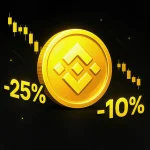Staying compliant on a global crypto exchange is not just smart—it’s necessary. If you’re trying to understand Binance regulations and restrictions, this guide breaks down what you need to know in plain language, from account verification and feature availability to region‑by‑region nuances and practical steps that keep your account in good standing.
Note: This article is informational and not legal or financial advice. Rules change quickly; always check your local laws and the official Binance legal pages before acting.
Quick signup perk for compliant users
If you plan to open an account, you can reduce your trading costs while staying on the right side of compliance.
- Use referral code CRYPTONEWER for a 20% fee discount and up to $10,000 in benefits
- Start here: Register on Binance with code CRYPTONEWER
- Availability, rewards, and fees depend on your region and eligibility. Terms apply.
Why regulations matter for crypto traders
Crypto markets move fast, but regulation moves, too. Binance operates multiple legal entities and adapts features market by market. Understanding Binance regulations and restrictions helps you:
- Avoid interruptions to deposits, withdrawals, and trading
- Know which products you can access (spot, margin, futures, options, Earn)
- Prepare KYC/KYB documents to pass verification smoothly
- Stay ahead of Travel Rule checks and address-screening rules
How Binance approaches compliance globally
While specifics vary by country, you’ll notice common pillars across jurisdictions:
- Identity verification (KYC): Required to unlock fiat deposits/withdrawals and most features. Expect government ID, selfie/biometric verification, and sometimes proof of address.
- AML/CFT controls: Monitoring transactions for illicit activity, sanctions screening, and source-of-funds checks in higher‑risk cases.
- Travel Rule compliance: For certain crypto transfers, exchanges must share sender/recipient details with other VASPs. You may see prompts to enter beneficiary name, exchange, or wallet ownership.
- Licensing/registration: In some regions, Binance operates through locally licensed entities; in others, services may be limited or unavailable.
Common restrictions you may encounter
1) Account creation and verification tiers
- Basic info: Email/phone and password to create an account.
- KYC Level: Requires ID and biometric verification; unlocks higher limits and access to fiat rails.
- Proof of address: Often needed for higher limits or specific features. Acceptable docs include bank statements or utility bills with your name and address.
- KYB for entities: Corporate accounts require company documents, UBO disclosures, and sometimes source-of-funds/source-of-wealth.
2) Deposits and withdrawals
- Fiat on-ramps: Availability depends on local banking partners and region. Expect stricter checks for large deposits.
- Crypto withdrawals: Certain networks or tokens may be paused during upgrades or heightened risk periods. Address whitelists and 2FA are strongly recommended.
- Travel Rule prompts: You might be asked to confirm whether the receiving wallet is your own, another exchange, or a hosted wallet, and to provide beneficiary details.
3) Trading features
- Spot trading: Broadly available but specific pairs vary by jurisdiction.
- Margin trading: Higher risk; may require additional eligibility checks.
- Derivatives (futures, options): Often the most restricted. Eligibility depends on your country, regulatory status, and whether you qualify as retail vs. professional.
- Leverage limits: Max leverage may be capped by the platform or regulator; risk controls can adjust leverage dynamically.
4) Earn, staking, and promotions
- Staking and Earn products: Availability differs by region due to local rules on yield‑bearing products.
- Launchpad/Launchpool: Token launches can be geo‑restricted; marketing and participation may be limited to eligible jurisdictions.
Regional snapshots for 2025
The landscape evolves quickly. Always verify the latest status on official pages, but here’s a high‑level, non‑exhaustive overview based on widely reported changes up to late 2024.
-
United States
- Binance.com does not serve U.S. persons. A separate platform (Binance.US) operates with a narrower token list and features compared to the global exchange. Derivatives and certain Earn products may be restricted for U.S. retail users.
-
United Kingdom
- Crypto promotions are tightly regulated under the FCA regime. Binance has implemented localized experiences and restrictions to align with the UK’s rules. Expect risk warnings, limited products, and eligibility checks. Derivatives eligibility for retail is typically restricted.
-
European Union / EEA
- MiCA’s phased rollout began in 2024, with further provisions taking effect in 2025. Expect tighter stablecoin rules, enhanced disclosures, and standardized consumer protections. Feature availability and communications may differ by member state during the transition.
-
Canada
- Binance exited the Canadian market in 2023 following regulatory changes. Residents are generally not onboarded to the global platform.
-
Australia
- Derivatives access for retail was restricted after licensing changes. Fiat rails and payment partners have varied over time; check current deposit/withdrawal options in your account.
-
Japan
- Binance re‑entered with a locally compliant entity. Residents must use the local platform with a curated token list and strict KYC aligned with JVCEA standards.
-
Singapore
- The previous local platform wound down in 2021. The global site imposes restrictions for Singapore residents. MAS rules emphasize investor protection; derivatives for retail are constrained.
-
Hong Kong
- A licensing framework allows approved VASPs to serve retail users for spot trading. Binance has not announced a retail VASP license for Hong Kong users on the global platform at the time of writing; availability may be limited.
-
Middle East (Bahrain and Dubai)
- Licensed entities in Bahrain and Dubai provide certain services to eligible users in line with local frameworks. Feature sets may differ from the global platform and can change as permissions evolve.
-
Latin America, Africa, and other APAC regions
- Availability of fiat pairs, P2P, and Earn products varies widely. Local policy shifts can affect on‑ramps, currency pairs, or product eligibility. Always confirm country‑specific terms in your account dashboard.
How to check your local rules fast
1) Confirm eligibility during signup: Start the process and view the products shown for your region.
2) Read the Terms and legal pages: Look for country‑specific services, prohibited jurisdictions, and feature lists.
3) Check your account dashboard: Product tiles sometimes reflect your current eligibility more accurately than generic FAQs.
4) Monitor announcements: Exchange blogs and email alerts often communicate regional changes.
Useful resources:
– Binance Help Center: https://www.binance.com/en/support
– Terms of Use and legal notices: https://www.binance.com/en/terms
– Risk warnings and product docs: https://www.binance.com/en/legal
Practical compliance tips for everyday users
- Finish verification early: Complete KYC/POA before you need to move funds. It prevents last‑minute delays.
- Set up strong security: 2FA, anti‑phishing code, withdrawal whitelist, and device management.
- Understand Travel Rule prompts: Keep recipient names and exchange details handy when transferring to another VASP.
- Keep documentation: Retain transaction receipts, bank statements showing fiat flows, and notes on the purpose of large transfers.
- Know your product: Spot, margin, futures, and Earn all carry different risks and regulatory treatment. If a feature disappears, it may be due to new rules in your region.
- Don’t use VPNs to bypass restrictions: This can violate Terms and jeopardize your account.
Binance futures and margin eligibility
Because derivatives carry higher risk, they are frequently limited:
- Jurisdiction checks: Your residency and sometimes your IP determine whether you can access futures or options.
- Appropriateness tests: You may be asked to complete questionnaires about experience and risk tolerance.
- Position and leverage limits: Expect caps that can tighten during volatile markets.
- Product availability: Options and coin‑margined contracts are more restricted than spot. Even if you see them listed globally, your account might not be eligible.
Crypto Earn, staking, and yield products
Yield products are treated differently around the world. Common patterns include:
- Retail access limits: Some regions restrict retail participation in staking or structured products.
- Token‑specific pauses: Staking for a particular network may be paused during upgrades or legal reviews.
- Redemption rules: Lockups, early redemption fees, or cooldowns can be mandated by local rules. Read the terms carefully before subscribing.
Taxes and reporting
Regulators increasingly require exchanges to report activity or provide standardized statements. Be prepared to:
- Download annual statements and tax reports from your dashboard
- Track cost basis and realized gains/losses for each jurisdiction where you file
- Provide documentation if your bank requests source‑of‑funds details for crypto‑linked transactions
Step‑by‑step: starting a compliant account with fee savings
1) Begin registration: Open a Binance account with code CRYPTONEWER for a 20% fee discount and up to $10,000 in benefits (subject to terms and regional eligibility).
2) Complete identity verification: Upload a valid government ID and complete the biometric check. If prompted, add proof of address.
3) Enable security: Turn on 2FA, set your anti‑phishing code, and consider enabling withdrawal whitelists.
4) Review eligible products: Your dashboard will show which features are available in your location.
5) Try a small test transaction: Validate your fiat or crypto rail with a minimal amount before moving larger sums.
Frequently asked questions about Binance regulations and restrictions
-
Is Binance legal in my country?
- It depends on your jurisdiction and the specific Binance entity. Some countries allow full access to spot trading but restrict derivatives or Earn. Others may be unavailable altogether.
-
Why did a feature disappear from my dashboard?
- Product availability can change due to new local rules, licensing status, or risk controls. Check announcements and legal pages.
-
Can I use a VPN to access restricted features?
- Using a VPN to bypass geo‑based rules can violate Terms of Use and put your account at risk.
-
What is the Travel Rule and why do I keep seeing prompts?
- For certain transfers to/from VASPs, exchanges must exchange sender/recipient data. You may need to enter the beneficiary name, the receiving exchange, or wallet ownership status.
-
How do I resolve a flagged withdrawal or deposit?
- Provide requested details (beneficiary, purpose, or proof of ownership). Contact support with transaction IDs, and keep relevant documents ready.
Final reminders
- Regulations evolve: Revisit your eligibility, especially after policy announcements in your region.
- Document first, move later: Keep KYC and source‑of‑funds materials ready to avoid delays.
- Use official channels: For the latest on Binance regulations and restrictions, rely on in‑app notices, legal pages, and verified announcements.
If you’re ready to onboard with a cost advantage while prioritizing compliance, use code CRYPTONEWER via this link: Join Binance with fee discounts.





